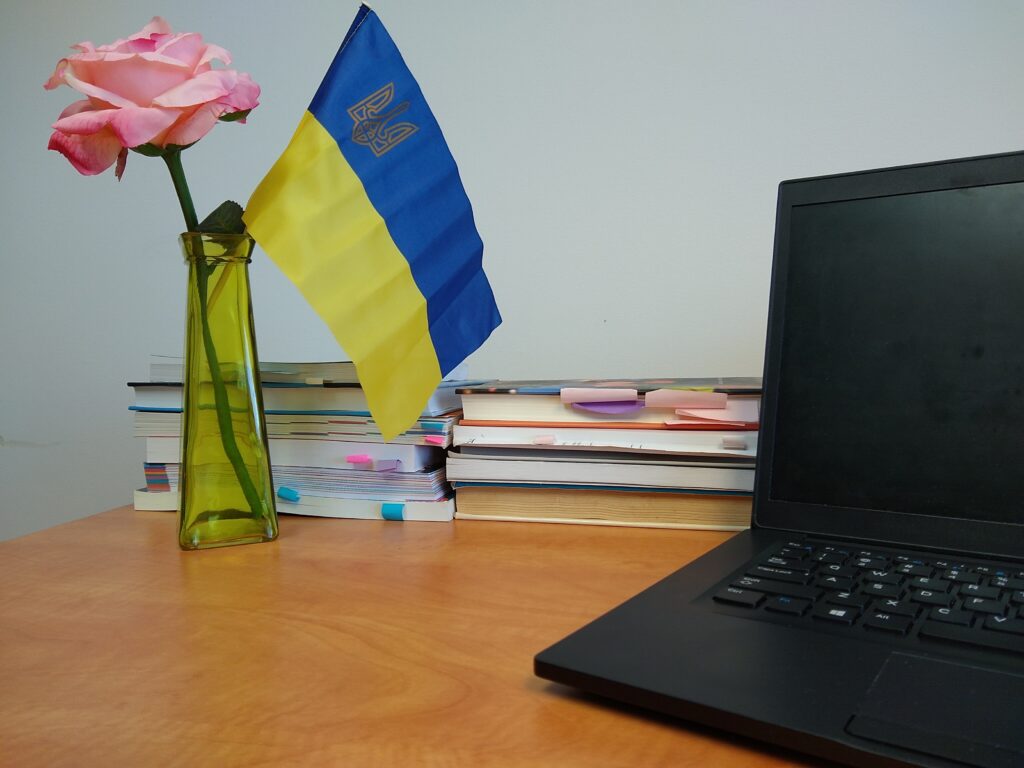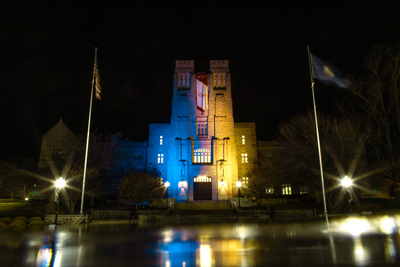English Philology
Dear Ukrainian colleagues,
We are devastated by the news of the Russian invasion in Ukraine. We stand united in our support of Ukraine! Even as the war is ongoing, we applaud your dedication to your students in continuing instruction. We understand that concentrating on teaching and research activities in such dire circumstances may be a heavy challenge, especially when your everyday life has been disrupted and as some of you had to evacuate without access to teaching materials. As your colleagues in academia, we have established this database in order to provide academic help for your curriculum. Below you will find a variety of materials that we are glad to share with you. The materials are divided into several subjects in the field of English philology (with a focus on English as a Foreign Language) that you might find helpful in your instruction. Our goal is to provide access to short activities that can be used in an online classroom setting – videos, readings, worksheets, exercises, etc. All of these can be used with minimal preparation and require between 15-30 minutes to complete. At this time, the list is rather limited, but we will continue to add materials.
If you have specific requests for materials, please feel free to contact us! We are glad to work with you on creating additional activities and exercises that would best fit your curriculum.
English Writing/Composition
Writing Prompts for Creative Nonfiction – a list of prompts a teacher could give creative-writing students who are writing creative nonfiction (contributed by Jeff Mann)
Writing Prompts for a Fiction Workshop – a list of prompts a teacher could give creative-writing students who are writing fiction (contributed by Jeff Mann)
Exploring Poetic Forms – a poetry writing exercise and some nonfiction writing prompts (contributed by Aileen Murphy)
Strategies for Writing: Writing from Scratch – video presentation focusing on overcoming the writer’s block and organizing ideas for academic writing (contributed by Kira Gulko Morse)
The Writing Process – video presentation describing the steps of the academic writing process (contributed by Kira Gulko Morse)
Writing Process – explanation of the most common stages of the writing process (contributed by Bruce McComiskey)
Rhetorical Breakdown of Social Media Post – this activity prepares students for multimodal transformation of their research project into a social media post that accurately reflects their argument by examining how an individual or group on a platform advocates for a cause that interests them (the students) (contributed by Jaclyn Drapeau)
Travel Poster Project – students create travel posters to explore rhetorical choices and practice document design (contributed by Laura Fehr)
Speech Analysis for Teaching Audience Awareness – analysis worksheet for Greta Thunberg short speeches and essay question about audience awareness (contributed by Laura Fehr)
Learning Sessions: Writing, Research, & Digital Literacy – a list of instructional video presentations (contributed by Tim Becker, Lisa Becksford, Julia Feerrar, Katlyn Griffin, Kayla McNabb, Chloe Jade Robertson, and Yemi Awotayo)
Curating a Writing Portfolio:
- How to Curate a Writing Portfolio
- Writing Portfolios for Self Discovery and Self Presentation
- Keeping Track of Portfolio Artifacts
Multimodal Composition & Digital Literacy:
Rhetorical Analysis Using the Five Ws:
Rhetorical Analysis Using the Stases:
What It Means to Be a Peer Reviewer:
Information and Document Design – lecture slides that review the concept of ‘rhetorical clustering’ to help students revise their professional documents (contributed by Chris Lindgren)
The Paramedic Method for Revising Prose – review and exercise of a rhetorical stylistic method for revising prose for concision and clarity (contributed by Chris Lindgren)
On Avoiding Readability Formulas – lecture slides on why readability formulas don’t help writers communicate and connect with audiences (contributed by Chris Lindgren)
Techniques on Writing English for Translation – reading review lecture about how to avoid common lexical and syntactical ambiguities, when writing English for translation in professional contexts (contributed by Chris Lindgren)
Revision: Style – handouts and exercises on revising sentence structure and word choice, as well as general style considerations (contributed by Rebecca Weaver-Hightower)
Revision: Sentences and Word Choice – exercises on sentence combining and word choice (contributed by Rebecca Weaver-Hightower)
Revision: Using Details – explanation and exercises on creating more engagine writing (contributed by Rebecca Weaver-Hightower)
Revision: Order and Emphasis on a Sentence Level – explanation and exercises (contributed by Rebecca Weaver-Hightower)
Revision: Weak Sentence Openers – exercise (contributed by Rebecca Weaver-Hightower)
Empathy in Composition – lesson plan (contributed by Dante Fuoco)
Research Methodology & Academic Writing
Introduction to Academic Research – a 6-min video presentation about how to conceptualize your role as a researcher (created by Odyssey Learning Project, Virginia Tech)
Introduction to Primary Research – an article focusing on the basic concepts in conducting primary research, along with a student worksheet and an answer key (contributed by Kira Gulko Morse)
How to Read a Journal Article – a workshop that teaches students the basic structure of a research paper and reading strategies (contributed by Meng Yu)
Evaluating and Incorporating Sources – handouts (contributed by Rebecca Weaver-Hightower)
Credibility Activity for Exploring Unreliable Sources – Flat Earth Society activity and essay questions for exploring source credibility and flawed logic (contributed by Laura Fehr)
Thesis, Focus, Development – advice for writing a clear thesis and focusing and developing paragraphs (contributed by Bruce McComiskey)
Paragraph Development – key words for paragraph development and transitions (contributed by Bruce McComiskey)
Drafting and Revising – advice for drafting and revising writing (contributed by Bruce McComiskey)
Concision – advice about how to make writing concise (contributed by Bruce McComiskey)
Outlining the Research Paper – this lesson provides the structure for the traditional argument-style research paper and uses a reading done earlier in the semester to work through a reverse outline (contributed by Jaclyn Drapeau)
MLA Style Works Cited Page – exercises and answer key (contributed by Rebecca Weaver-Hightower)
Introduction to Academic Writing for Graduate Students – packet of materials with explanations, examples, and exercises (contributed by Shakil Rabbi)
English Reading/Literature/Film
“Concert in the Park of Culture” by Ed Falco – literary and ethical questions raised by a prose poem like “Concert in the Park of Culture,” which takes as its subject matter the massacre of Ukrainians by the Soviets in 1939 (contributed by the author, Ed Falco)
“Only Daughter” by Sandra Cisneros – a short essay and a list of comprehension and reflection questions/activities (contributed by Kira Gulko Morse)
“Morning Song” by Sylvia Plath – text of the poem and discussion questions (contributed by Jane Wemhoener)
Навчальний посібник з позалекційного читання та відео (автор Ольга Дмитрук) – “Harry Potter and the Prisoner of Azkaban” by J.K. Rowling, “Bridget Jones’ Diary” by H. Fielding, “Starter for Ten” by D. Nicholls, “Ghost Stories” by M.R. James
Методичні розробки з позалекційного читання (автор Ольга Дмитрук) – “Everyone Worth Knowing” by L. Weisberger
Методичні розробки з позалекційного читання (автор Ольга Дмитрук) – “The Perks of Being a Wallflower” by S. Chbosky
Методичні розробки з аудиторного перегляду відео (автор Ольга Дмитрук) – TV Show “Gossip Girl” Season 1, Episodes 1-5
Методичні розробки з аудиторного перегляду відео (автор Ольга Дмитрук) – TV Show “White Collar” Season 1, Episodes 1-5
Kate Chopin’s “The Story of an Hour”: Reading a Life – short story text and discussion/comprehension questions with possible answers (contributed by Shoshana Milgram Knapp)
Resources for American Literary Study – a spreadsheet with internet links to freely available materials for the study of the American literature (contributed by Ashley Reed)
English Grammar & Punctuation
Grammar Revision Checklist – a worksheet on common grammatical errors in college writing (contributed by Meng Yu)
Commas – advice about using commas in writing (contributed by Bruce McComiskey)
Active/Passive Voice – explanation and exercises (contributed by Rebecca Weaver-Hightower)
Punctuation – explanation and exercises (contributed by Rebecca Weaver-Hightower)
Strong Verb Usage – explanation and exercises (contributed by Rebecca Weaver-Hightower)
Linguistics
The Ling Space – a website with videos on a variety of topics in linguistics – the videos are divided by topic, there is written commentary to go with each episode, and the episodes are fairly short (recommended by Charlene Eska)
Variation in Signed Languages (focus on American Sign Language) – lecture and reflections on ASL variation reading; can be self-guided or you can use word doc to guide students through the ppt slides (contributed by Katie Carmichael)
Exercises in Historical Linguistics – sound change, morphological change, comparative reconstruction (contributed by Katie Carmichael)
Examples of Discourse – examples of discourse, exercise with answer key (contributed by Bruce McComiskey)
Morphological Analysis – exercises to figure out morphemes in unknown languages (contributed by Abby Walker)
Sociolinguistics Assignment: Paying Attention! – assignment asks students to look out for interesting linguistic variation they hear/see, and/or comments about language they hear (contributed by Abby Walker)
Language Contact – lecture on results of language contact (pidgin, creole, codeswitching, etc); some reflection activities included (contributed by Katie Carmichael)
Language Ideologies – individual and group discussion assignments based on “My Fair Lady” (1964 film) (contributed by Kira Gulko Morse)
Forms of Communication – personal reflection and Emoji assignments (contributed by Kira Gulko Morse)
Language Choice – personal reflection assignment based on the concepts of code-switching and individual language shift (contributed by Kira Gulko Morse)
Communication Studies & Discussion Topics
“Проблеми сучасного світу крізь призму англомовних комунікативних стратегій” – навчальний посібник, робоча версія (Ольга Дмитрук) / Modern World Challenges Through Communicative Strategies in English – teaching materials for reading, watching, and mastering communication strategies analysis; working version (Olga Dmytruk)
Навчальний посібник з розмовних тем та відео на тему “Sport: Make It or Break It” (автор Ольга Дмитрук)
Interacting with Students after a Traumatic Event (Resources for Faculty)
The following resources were shared by Thomas Cook Counseling Center, Virginia Tech University, www.ucc.vt.edu. These resources were not created specifically for the current situation in Ukraine, but they may be useful for faculty in Ukraine at this time.
*Dealing with the Aftermath of Tragedy in the Classroom:
*Suggestions for Faculty When Dealing with Tragedy:
*Identifying Distressed Students & Guidelines for Interaction:
https://ucc.vt.edu/about/appointments/faculty_information.html
——-
ADDITIONAL ONLINE RESOURCES:
*Coping with Traumatic Stress Reactions (from National Center for Post-Traumatic Stress Disorder)
https://www.ptsd.va.gov/gethelp/coping_stress_reactions.asp
*Coping Tips for Traumatic Events and Disasters (from U.S. Department of Health & Human Services)
https://www.samhsa.gov/find-help/disaster-distress-helpline/coping-tips
*Post-Traumatic Stress Disorder (from National Institute of Mental Health)
https://www.nimh.nih.gov/health/publications/post-traumatic-stress-disorder-ptsd
This ongoing project is organized by Dr. Kira Gulko Morse (Department of English, Virginia Tech University, USA). We are very grateful to all the colleagues at Virginia Tech and other universities for contributing their materials to the database.
- With questions and material requests, please contact Dr. Kira Gulko Morse at kgmorse@vt.edu
- For more information about the project, go to https://liberalarts.vt.edu/departments-and-schools/department-of-english/academic-support-for-ukraine.html
- For more information about the Department of English at Virginia Tech, go to https://liberalarts.vt.edu/departments-and-schools/department-of-english.html

